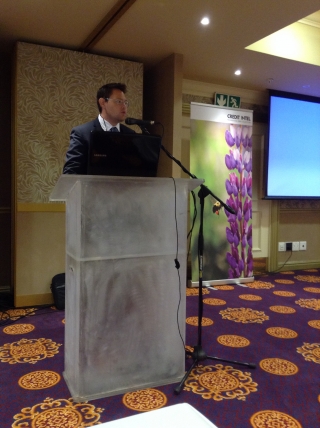New law sees many debt collectors either close down or face significant financial difficulty
Held on 18 February at Emperor’s Palace, Johannesburg, the Conference was attended by members of First National Bank, Nedbank, PASA, attorneys’ firms, the Consumer Profile Bureau and many others. Also in attendance were the Banking Ombudsman, Clive Pillay and Credit Intel Key Accounts Manager, Bennett Baloyi.
With each passing day, the debt collection industry awaits the promulgation of the notorious National Credit Amendment Bill; most notable for a proposed ban on the collection and sale of prescribed debt, which will see many debt collectors either close down completely or take significant financial knocks. Michael Shackleton spoke on the Bill and suggested that the proper implementation of the already existent National Credit Act would strike a fair balance between promoting the business of legal credit lenders and protecting debtors from unscrupulous lenders.
Shackleton also indicated that the NCAB will create greater regulation under which credit providers will have to operate, at a time when reduced regulation and the cutting of bureaucratic red tape is necessary to reduce unemployment and to cause small companies to thrive. Small companies are the engine of job creation in Gauteng.
Marina Short, CEO of the Consumer Profile Bureau, delivered an outstanding speech on regulatory data and the credit market. She is somewhat of an authority regarding credit and she genuinely provided valuable insights to all the attendees.
FutureSoft CEO, Peter Rafferty, spoke on the prescription of debt whilst advocate Hannelie Gray talked on emolument attachment orders.
Thav Reddy, Head of Compliance at Nedbank’s MFC division, educated attendees on how to manage the implementation of the Protection of Personal Information Act.
Marie Smit, Compliance Manager at PASA, suggested measures on how to increase the security of payments, something which is surely on the mind of all, considering the technological developments of the present day and the so-called “scam artists” living by fraudulent means within the Republic of South Africa.
Leon Townsend delivered an incredible and interactive speech concerning strategies to limit fraud. He is Executive Director at Censeo and a Certified Fraud Examiner. His organisation assists credit providers to assess which debtors to provide loans to by determining which prospective debtors are the most prone to commit fraud.
The conference was chaired by Credit Intel Senior Legal Executive Michael Shackleton, who is well known as a leading attorney in debt collection.
It was a highly educational and thought provoking Conference which Credit Intel was glad to be part of. Credit Intel prides itself on professional service and seeks to become the authoritative voice on debt collection in South Africa. Being invited to present and give inputs at Conferences such as these indicates that many people are turning to Credit Intel as an authority on debt collection.
Practical Guidance In-house Adviser aims to enrich corporate legal teams
LexisNexis South Africa, a leading provider of content and technology solutions for the legal and professional markets, has released a ninth practice area in its intuitive Practical Guidance online solution.
Practical Guidance In-house Adviser aims to equip in-house legal counsel, risk managers, company secretaries and project managers with not only technical information, but also insight that better enables them to influence stakeholders and effectively manage teams. The solution’s extensive taxonomy covers seven main topics in critical areas such as Legal Resource Management for In-house Lawyers, Business Skills and Getting the Deal Through.
The Practical Guidance offering from LexisNexis is an online interface with dynamic search functionality linking users to guidance notes, commentary, legislation, case law, forms, precedents, checklists and other resources, all in one place and at their fingertips. Chantelle Maree, Practical Guidance manager at LexisNexis South Africa, said the new practice area would complement existing ones available for Business Law and Corporate Governance.
“Its content is authored in the UK, but tailored for the South African market by local authors, with additional practical aids such as business continuity plans, policy documents and electronic handbooks,” she says.
There are also anecdotes from global leaders, who share their experiences in creating legal teams, dealing with change and lessons learned.
Maree adds: “Practical Guidance has tremendous value especially among professionals and firms who might not have the time and resources to sift through reams of information in order to stay up to date with the latest legal developments and opinions.”
Included in the latest practice area are invaluable Doing Business Guides, which aim to make it effortless to conduct business in key global jurisdictions such as the United Kingdom, United States of America, Brazil, Canada, China and many others.
To date, nine Practical Guidance practice areas are available for Business Law, Labour, Labour Public Sector, Income Tax, VAT, Corporate Governance, Civil Procedure, Family Law and In-house Adviser. All content is written by experts in each field.
For more information on the Practical Guidance series, which is fully integrated with the MyLexisNexis deep research library, visit www.lexisnexis.co.za/practicalguidance.
Understanding and mitigating the risks of social media in the workplace (Workshop 2014)
Companies are rapidly seeing the benefits of social media. In fact, social media is becoming indispensable for business, but with all the benefits come threats and risks as well for the workplace. Frost & Sullivan’s Global Workforce Study found that 64% of respondent companies limit employee access to social media through content filtering and website blocking technology, 51% restrict access by setting and enforcing policy and 25% have no restrictions on the use of social media by employees.
Businesses should define clear social media usage policies, specifying who can access social media, what sites they can access, when they can access them, where they can access them and what devices they can use to access social media during work hours. There should be no room left for confusion. Policies should be clear, well defined and communicated to employees.
Professionals who would benefit by attending include HR Managers, Digital Marketers, Chief Risk Officers, Social Media Strategists, Office Managers, Marketing Managers, HR Consultants, Employee Benefit Managers, Legal Advisors, Digital Projects Managers, e-Commerce Managers, Risk Managers to name a few...
Rosalind Davey and Khomotso Makapane will facilitate the workshop, teaching all attendees how to understand and and mitigate the risks of social media in the workplace. Both of the facilitators are qualified attorneys from one of South Africa’s top law firms Bowman Gilfillan and specialise in employment law and Rosalind is one of the few attorneys specialising in social media law.
During the half day workshop social media statistics, constitutional rights, RICA, freedom of expression and the law of defamation, liability for defamatory content on social media and vicarious liability, handling social media misconduct, loss of confidential information and contacts as well as mitigating the risks of social media will be addressed. View full agenda and download registration form at www.aoevents.co.za
Workshop registration fee: R800 pp. Groups of 3 or more receive 10% discount.
Email the completed registration form to This email address is being protected from spambots. You need JavaScript enabled to view it. to secure your seat.
WHERE ARE SOUTH AFRICA’S POTENTIAL WOMEN DIRECTORS?
They are in South African companies and industries right now, although they may not be part of traditional networks and are unlikely to be present at the higher levels of management in the same numbers as men. It is for this reason that BPW SA and the Department of Trade & Industry (the dti) have partnered in an unrivalled “Women on Boards” director development programme to create a pool of female leaders in SA who are excellently trained and are therefore highly sought after by Boards.
Most people today have no knowledge about the makeup of corporate boards, even in the companies they work for. These people would be surprised to learn how little diversity of thought and experience exists in the corporate boardrooms and executive suites of South African businesses. Why should you care about board composition? Boards of directors make decisions that can impact you, your community, and the country. That’s why it’s important that membership on corporate boards be representative of a company's constituents.
Boards of directors choose CEOs. They make decisions about executive compensation, whether to buy, sell, or merge with other companies, where corporate offices close and relocate, and how much priority a company gives to issues other than profits, such as social responsibility.
Our Women on Boards programme will give you the expertise and exposure needed to be part of the right networks. It is an eight-part program — strategically placed over the course of 8 months, due to the complexity of the material — equips women with the knowledge and tools needed to elevate themselves to the C-suite and beyond. In a supportive and highly interactive atmosphere, an impressive roster of top government and corporate experts will guide skilled female executives through a rigorous program of intensive classroom instruction, case studies and simulations. Every element of the program is focused on strengthening and broadening the leadership talents of the participants and delivering positive results for their companies and organizations. They will improve their understanding of the responsibilities of board membership and develop the skills and strategic insight needed to become a more effective director. They will improve their understanding of board governance while heightening their financial literacy and increasing their understanding of relevant legislation. Amongst others, specialist training is also provided by the Johannesburg Stock Exchange (JSE) with regard to corporate governance and understanding of JSE terminology and the Commonwealth Business Council (CBC) (London) who will impart their expertise on personal and reputational risk. The dti will convey their expectations of board members and corporate experts will present, and execute simulations, on media and presentation skills to enhance leadership effectiveness. The programme is certified by the dti.
For more information, please visit our website at www.bpw-jhbsa.co.za .or contact This email address is being protected from spambots. You need JavaScript enabled to view it. or 011 794-4991.




